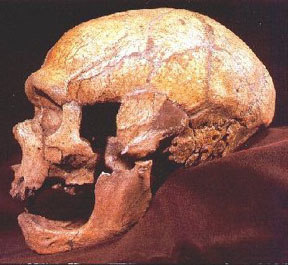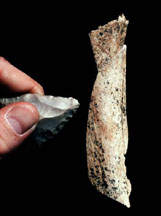
June 11 - July 20, 2012
(Class begins Monday morning, June 11 and ends Friday, July 20. Students are expected to arrive either June 9 or June 10 and depart on Friday, July 20)
Overview
 With
the participation of French and American physical
anthropologists and archaeologists, this program has as its principal
academic focus the examination of the major evolutionary developments that have
resulted in the appearance of modern peoples, their unique behaviors and
adaptations.
With
the participation of French and American physical
anthropologists and archaeologists, this program has as its principal
academic focus the examination of the major evolutionary developments that have
resulted in the appearance of modern peoples, their unique behaviors and
adaptations.
The classroom part of the program, the first four weeks, is held at the University of Bordeaux,
in a part of
Just to the east of
Field trips to these and other sites will be an important part of the course, and will provide an essential background to classroom discussions.
Program
participants will have a chance to explore the actual sites where the
neandertal and early modern human fossils examined in class have been
discovered.
Visits to cave sites such as Rouffignac, Lascaux II, Cap Blanc and Font-de-Gaume, where cave art of great beauty has been preserved, will enable students to capture the ambiance of the caves and the mysteries of the art work.
The last two weeks of the course will find us in the Charente, a
department about 100 km to the north and east of
In this way, students will be able to more fully appreciate the context in which these works of art were produced, a feeling no published reproduction can convey.
An equally crucial aspect of the course is making the students aware of life
in another culture.
 http://www.princeton.edu/travel/policies
http://www.princeton.edu/travel/policies
IMPORTANT: Undergraduate students are responsible for reading and following the information on the website, completing all travel forms and registering the trip on the University Travel Database as a part of the approval process. During the program, weekend travel outside group-organized activities must also be updated on the Travel Database. Students are expected to complete all relevant Undergraduate Student Travel requirements as stated in the website.
Home | Bordeaux Highlights | Past Participants | Accomodations | Faculty | Program of Study
Archaeological Excavations | Course Description and Credit | Syllabus | Application | Contact